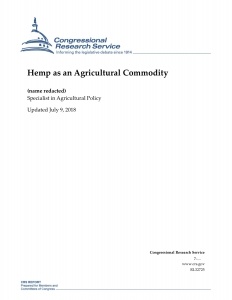Hemp as an Agricultural Commodity
Hemp industry and commodity exchange requirements
Hemp is an agricultural commodity which has strong potential to impact mainstream commodity markets in food, fibre, fuel and medicine. Understanding hemp as a commodity is key to developing the industry infrastructure including hemp commodity exchanges.

Download Hemp as an Agricultural Commodity is sourced from CRS reports.
Industrial Hemp’s Potential as an Agricultural Commodity
Industrial hemp is an agricultural commodity that is cultivated for use in the production of a wide range of products, including foods and beverages, cosmetics and personal care products, nutritional supplements, fabrics and textiles, yarns and spun fibres, paper, construction and insulation materials, and other manufactured goods. Hemp can be grown as a fibre, seed, or other dual-purpose crop. However, hemp is also from the same species of plant, Cannabis sativa, as marijuana. As a result, production in the United States is restricted due to hemp’s association with marijuana, and the U.S. market is largely dependent on imports, both as finished hemp-containing products and as ingredients for use in further processing (mostly from Canada and China). Current industry estimates report U.S. hemp sales at nearly $700 million annually.
In the early 1990s there was a sustained resurgence of interest to allow for commercial hemp cultivation in the United States. Several states conducted economic or market studies and initiated or enacted legislation to expand state-level resources and production. Congress made significant changes to federal policies regarding hemp in the 2014 farm bill (Agricultural Act of 2014 (P.L. 113-79, §7606). The 2014 farm bill provided that certain research institutions and state departments of agriculture may grow hemp under an agricultural pilot program. The bill further established a statutory definition for industrial hemp as “the plant Cannabis sativa L. and any part of such plant, whether growing or not, with a delta-9 tetrahydrocannabinol concentration of not more than 0.3 percent on a dry weight basis.” Delta-9 tetrahydrocannabinol is the dominant psychotrophic ingredient in Cannabis sativa. In subsequent omnibus appropriations, Congress has blocked the U.S. Drug Enforcement Administration (DEA) and federal law enforcement authorities from interfering with state agencies, hemp growers, and agricultural research. Appropriators have also blocked the U.S. Department of Agriculture (USDA) from prohibiting the transportation, processing, sale, or use of industrial hemp that is grown or cultivated in accordance with the 2014 farm bill provision.
Despite these efforts, industrial hemp continues to be subject to U.S. drug laws, and growing industrial hemp is restricted. Under current U.S. drug policy, all cannabis varieties—including industrial hemp—are considered Schedule I controlled substances under the Controlled Substances Act (CSA, 21 U.S.C. §§801 et seq.). Although hemp production is generally allowed following requirements under the 2014 farm bill, some aspects of production remain subject to DEA oversight, including the importation of viable seeds, which still requires DEA registration according to the Controlled Substances Import and Export Act (21 U.S.C. §§951-971). Other guidance from DEA, USDA, and the Food and Drug Administration provides additional clarification regarding federal authorities’ position on hemp and its future policies regarding its cultivation and marketing. This guidance supports DEA’s contention that the commercial sale or interstate transfer of industrial hemp continues to be restricted.
Congress has continued to introduce legislation to further advance industrial hemp and address these types of concerns in the next farm bill. Introduced legislation as part of the Industrial Hemp Farming Act—first introduced in the 109th Congress and greatly expanded over the past few years—seeks to further facilitate hemp production in the United States but would also amend the CSA to specify that the term marijuana does not include industrial hemp. An expanded version of this bill was introduced in the 115th Congress in both the House and Senate (H.R. 5485; S. 2667). Many of the provisions in these bills are included in the Senate-passed 2018 farm bill (H.R. 2) that is now being debated in Congress. Similar provisions are not part of the House version of the 2018 farm bill (H.R. 2). Myriad other bills introduced in both the House and the Senate would further amend the CSA and other federal laws to address industrial hemp.

